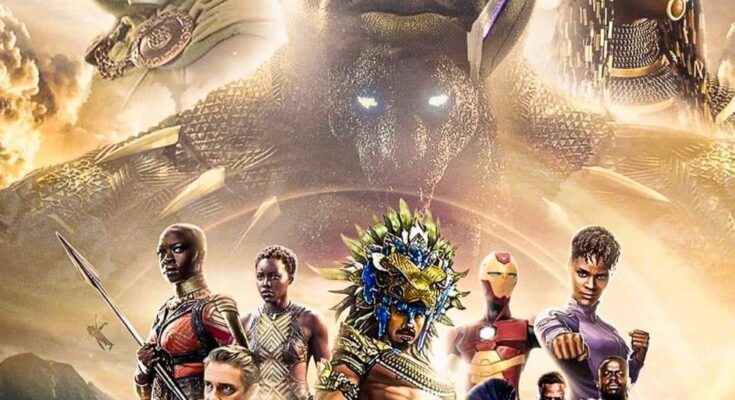“Black Panther: Wakanda Forever,” released in 2022, is a powerful continuation of the Marvel Cinematic Universe (MCU) and a poignant tribute to the late Chadwick Boseman, who portrayed the iconic character T’Challa, the Black Panther. Directed by Ryan Coogler, the film features returning stars Letitia Wright, Lupita Nyong’o, Danai Gurira, and Angela Bassett, alongside new cast members including Tenoch Huerta and Michaela Coel.
The film begins with the nation of Wakanda mourning the death of King T’Challa. The grief of the Wakandan people is palpable, and the impact of his loss is felt deeply by his family, including his sister Shuri (Letitia Wright), his mother Queen Ramonda (Angela Bassett), and his former lover Nakia (Lupita Nyong’o). Shuri, a brilliant scientist, struggles to cope with the loss of her brother and throws herself into her work, grappling with the immense pressure of potentially stepping into his shoes.
As Wakanda faces political and social upheaval, a new threat emerges from the depths of the ocean. The underwater kingdom of Talokan, led by Namor (Tenoch Huerta), poses a significant danger to the surface world. Namor, a powerful and enigmatic ruler with his own motivations and grievances, views the emergence of Wakanda as a potential ally or adversary. His kingdom, rich in vibranium, adds complexity to the global dynamics and the struggle for this rare and powerful resource.
Queen Ramonda and Shuri must navigate these turbulent waters, balancing their grief with the need to protect their nation. The film delves into the rich cultural heritage of both Wakanda and Talokan, exploring themes of legacy, power, and responsibility. As the story unfolds, Shuri’s journey becomes central, evolving from a grieving sister into a leader capable of honoring her brother’s legacy while forging her own path.
Letitia Wright delivers a standout performance as Shuri, portraying her character’s evolution with depth and nuance. Her struggle with loss, identity, and leadership forms the emotional core of the film. Angela Bassett’s portrayal of Queen Ramonda is powerful and regal, embodying the strength and resilience of a leader facing immense challenges.
Tenoch Huerta’s Namor is a compelling antagonist, with a complex backstory that adds layers to his character. His kingdom of Talokan, inspired by Mesoamerican cultures, is visually stunning and rich in history, providing a fascinating counterpoint to Wakanda’s Afrofuturism. Huerta’s performance captures Namor’s intensity and determination, making him a formidable presence on screen.
The supporting cast, including Lupita Nyong’o as Nakia, Danai Gurira as Okoye, and Winston Duke as M’Baku, continue to shine, adding depth and continuity to the narrative. Michaela Coel’s introduction as Aneka, a warrior and member of the Dora Milaje, adds a fresh dynamic to the ensemble.
Ryan Coogler’s direction maintains the film’s balance of action, emotion, and cultural exploration. The screenplay, co-written by Coogler and Joe Robert Cole, skillfully weaves together themes of grief, heritage, and geopolitical tension, creating a story that resonates on multiple levels.
Visually, “Wakanda Forever” is a feast for the eyes. The production design, costumes, and special effects bring the worlds of Wakanda and Talokan to life with breathtaking detail. The film’s underwater sequences are particularly impressive, showcasing innovative filmmaking techniques and stunning visuals.
The film’s score, composed by Ludwig Göransson, builds on the themes from the original “Black Panther” while introducing new musical elements that reflect the film’s expanded cultural scope. The soundtrack, featuring a blend of traditional African and contemporary music, enhances the film’s emotional and epic tones.
“Black Panther: Wakanda Forever” stands as a heartfelt tribute to Chadwick Boseman, honoring his legacy while pushing the story forward in meaningful ways. It is a testament to the resilience of the Wakandan people and the enduring power of their cultural heritage.
Black Panther: Wakanda Forever (2025)🔥


